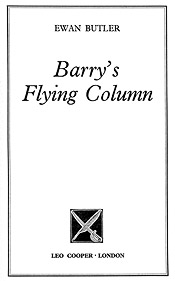
Foreword
November 1970 will see
the fiftieth anniversary of the action fought
at
Kilmichael by the Flying Column of Cork No. 3 Brigade under
my command. This was the second formal engagement
between the
Brigade and Crown forces - the first had taken place at
Toureen five
weeks earlier.
It may sound presumptuous to describe as a 'formal
engagement'
an action which
involved thirty-six Volunteers on the Irish side and
eighteen members of the Auxiliary Division, Royal
Irish Constabulary' on the
British. Yet the results of this fight were out of all
proportion
to the numbers engaged in it, and the fiftieth anniversary
will be marked by appropriate ceremonial.
In his book, Mr Butler has given an essentially fair
account of our
operations in the Anglo-Irish War, which
was fought from 1919 to 1921. He has sought to balance the British and Irish
accounts of the
campaign in West Cork. I can
hardly be expected to agree with
much of what has been written on the
British side, and I do not. My own book, Guerrilla Days in Ireland, which
was published twenty-one years ago, and upon
which Mr Butler has based many of his facts, is still accurate from the Irish
point of view.
Fifty years have passed since those guerrilla days,
and I am glad
that this book should
appear at this moment.
Shortly after the American Civil War, in which
thousands of
Irishmen fought on
both sides, General Richard Taylor of
Louisiana, lately a General of the Army of the Confederation, said:
'Strange people, these Irish! Fighting every
one's battles and cheerfully taking the hot end of the poker, they are only
found wanting
when engaged in what
they believe to be their national cause.'
Half a century ago the old Irish Republican Army took
the hot
end of the poker in
Ireland's cause. Today we, the veterans, like to
feel that we were not found wanting.
Cork City. May 1970.